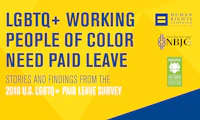
2018 U.S. LGBTQ+ Paid Leave Survey
HRC Foundation released a report detailing the results of its groundbreaking nationwide survey of LGBTQ+ people that reveals an urgent need for inclusive employer-paid family and medical leave.
Non-discrimination policies, benefits and other practices that include LGBTQ+ workers are essential for businesses as they compete for talent and customers.


HRC Foundation released a report detailing the results of its groundbreaking nationwide survey of LGBTQ+ people that reveals an urgent need for inclusive employer-paid family and medical leave.

For the estimated 1.8 million LGBTQ+ people of color in the American workforce, existing forms of discrimination can further limit access to paid parental, family care and medical leave.

Medically necessary treatments and procedures, such as those defined by the World Professional Association for Transgender Health's Standards of Care for Gender Identity Disorders, should be included in employer-provided healthcare…

HRC's Corporate Equality Index report, released each fall, provides an in-depth analysis and rating of large U.S. employers and their policies and practices pertinent to lesbian, gay, bisexual, transgender and…

A business typically relies on other businesses for goods or services. These businesses are referred to as suppliers or vendors, and the activity between businesses is referred to as Business-to-Business,…

Unlike other diversity categories, such as race and gender, employers are not required to collect statistics on the number of LGBTQ+ people they employ.